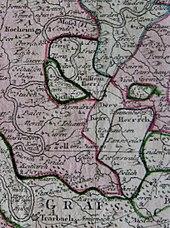Lordship of Winneburg and Beilstein Herrschaft Winneburg und Beilstein | |||||||||
|---|---|---|---|---|---|---|---|---|---|
| 1488–1801 | |||||||||
| Status | Lordship | ||||||||
| Capital | Beilstein | ||||||||
| Common languages | Moselle Franconian | ||||||||
| Government | Lordship | ||||||||
• from 1652 | House of Metternich | ||||||||
| Historical era | Middle Ages | ||||||||
• Lordship founded | 13th century | ||||||||
• Fiefdom of Trier | 1488 | ||||||||
• Ceded to France | 1801 | ||||||||
• Acquired by Prussia | 1815 | ||||||||
| |||||||||

The Lordship of Winneburg and Beilstein (German: Herrschaft Winneburg und Beilstein) was a territory of the Holy Roman Empire made of non-contiguous parts located in the Moselle Valley around Winneburg Castle near Cochem, and Beilstein, on the Moselle River. It should not be confused with the County of Beilstein, or Nassau-Beilstein, which belonged to the House of Nassau.
The Lords of Winneburg were firstly mentioned in a 1304 deed, they also acquired the estates of the neighbouring Beilstein Castle in 1362. In the following decades the Lords of Winneburg and Beilstein were forced to give their lands in pawn to the Archbishops of Trier, who after a feud finally seized the property in 1488, only to lend it back as a fiefdom a few years later.
After the Winneburg-Beilstein line had become extinct, the descendants of the Trier archbishop Lothar von Metternich (1551–1623) from 1635 on called themselves Freiherren von Metternich-Winneburg zu Beilstein and were elevated to Imperial counts in 1679. The last Count, Franz George Karl, lost his territory to France when that country officially annexed the left bank of the Rhine following the 1801 Treaty of Lunéville. He was however compensated in the course of the German mediatization with the possession of secularised Ochsenhausen Abbey and the princely title in 1803.
According to the Final Act of the Congress of Vienna, Winneburg-Beilstein together with the Rhineland fell to Prussia in 1815. Franz George Karl's son, Prince Klemens Wenzel von Metternich took the chance to buy the ruin of Winneburg Castle in 1832 but never rebuilt it.
